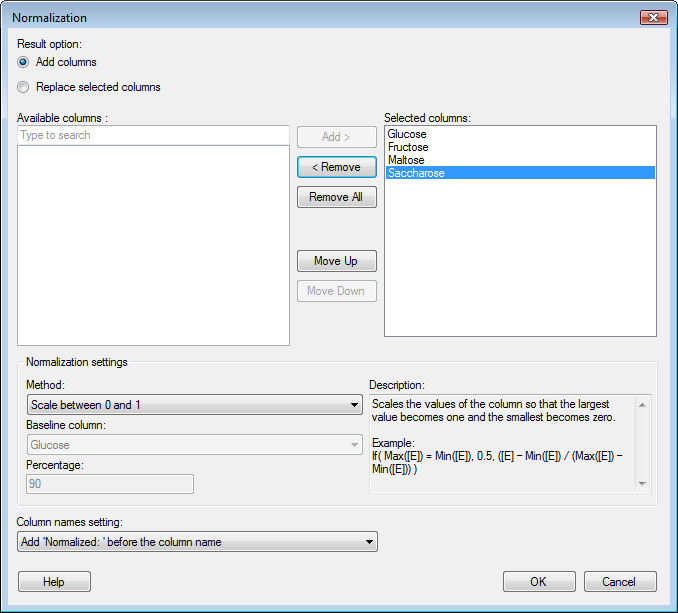
Normalization can be used as a transformation step when adding or replacing data tables. Tip: You can replace a data table with a transformed version of itself.
To reach the Normalization dialog:
Select File
> Add Data Tables... or File > Add
On-Demand Data Table... and add the data of interest.
If you already have an analysis open, you can also choose:
File > Replace Data Table...
Insert > Columns...
or Insert > Rows...
Click Show transformations.
Select Normalization from the drop-down list and click Add....

Option |
Description |
Result
options |
|
Add
columns |
Click this radio button to add new normalized columns to the resulting data table. The old columns will also be kept. |
Replace
selected columns |
Click this radio button to replace the old columns with the new, normalized ones. |
Available
columns |
Lists the columns available in the selected data source. |
Add
> |
Moves the columns selected in the Available columns list to the Selected columns list. |
<
Remove |
Removes the selected columns from the Selected columns list. |
Remove
All |
Removes all columns form the Selected columns list. |
Move
Up |
Moves the selected column in the Selected columns list up one step. |
Move
Down |
Moves the selected column in the Selected columns list down one step. |
Selected
columns |
Lists the columns that are selected to be normalized. |
Method |
Specifies the normalization method to use. See Normalizing Columns and the theory section for each method for further information about the various methods. |
Baseline
column |
Specifies the baseline column to use (in some normalization methods only). |
Percentage |
Specifies the percentage value (P) to use when normalizing by percentile or by trimmed mean. |
Description |
Shows a brief description of the currently selected normalization method. |
Column
names setting |
Specifies how the naming of the normalized columns should be handled. You can either add the word "Normalized:" to the column name of the original columns or use the expression (normalization equation) as a column name. If you have selected to replace columns you will also get a third option where you can keep the current column names. |
See also: